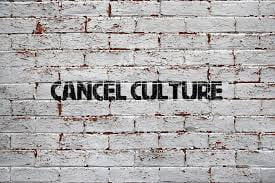
Cancel Culture refers to the popular practice of withdrawing support for (canceling) public figures and companies after they have done or said something considered objectionable or offensive.
Being held accountable isn’t new.
If a public figure has done something or has said something offensive to me why can’t I express my displeasure or discontinue my support for them? Cancel culture is just accountability culture. Words have consequences, and accountability is one of them. However, this is nothing new. We are judged by what we say in our professional and personal lives. For example, whether we like it or not when we’re on a job hunt we are held accountable for what we say or may have said in the past. According to Sandeep Rathore, (2020, May 5). 90% of Employers Consider an Applicant’s Social Media Activity During Hiring Process, employers believe that social media is important to assess job candidates. This article explains that these jobs are searching your social media for certain red flags like, anything that can be considered hate speech, illegal or illicit content, negative comments about previous jobs or client, threats to people or past employers, confidential or sensitive information about people or previous employers. Seems like a prospective employer can cancel you for a job for things you may have done or said in the past. Sound familiar?
You ever been on a first date? Has your date ever said something so objectionable or offensive that you just cancel them after the first date? I’m sure it has happened to some people. This is just another example of people being held accountable for what they say.
Most public figures who are offended by cancel culture have a feeling of entitlement. They feel they have the right to say anything, even if it’s offensive and hurtful, and bear no accountability. In Sarah Hagi, (2019 November 19). Cancel Culture is not real, at least not in the way people believe it is, Hagi explained that Cancel Culture is turned into a catch-all for when people in power face consequences for their actions or receive any type of criticism, something that they’re not used to.”
What harm is Cancel Culture causing?
Many cancel culture critics say cancel culture is limiting free speech. This I don’t get. The very essence of cancel culture is free speech. Public figures have the right to say what they want and the public has the right to express disapproval and displeasure with what they said. Sometimes this comes in the form of boycotting, blogging, social media posting etc. Public figures who feel that they have been cancelled might have bruised egos, be embarrassed, or might have their career impacted a little but that comes as a consequence of free speech. A Public figure losing fans, customers, or approval in the public eye is not an infringement on their rights. It’s just the opposite. It’s the people of the public expressing their free speech. They have the right to be a fan of who they want, a customer of who they want, and to show approval for who they want. Lastly, Cancel Culture can be open dialogue but rarely do we see the person that is on the receiving end of a call out wanting to engage in open dialogue with the people who are calling them out.
No public figures are actually getting cancelled.
According to AJ Willingham, (2021 March 7). It’s time to Cancel this talk of cancel culture, “people who are allegedly cancelled still prevail in the end”. The article gives an example of when Dr. Sues was supposedly cancelled due to racist depictions in his book, but instead his book sales actually went up. Hip Hop rapper Tory Lanez was supposedly cancelled for allegedly shooting female rapper Megan the stallion in the foot. Instead of being cancelled he dropped an album describing what happened the night of the shooting and his album skyrocketed in sales. There are numerous examples that show that people are not really being cancelled, but instead simply being called out for their objectionable or offensive behavior.
Who are the real victims here?
In AJ Willingham, (2021 March 7). It’s time to Cancel this talk of cancel culture, the article states “there are real problems that exist…. to know the difference look at the people who actually suffer when these cancel culture wars play out. There are men and women who allege wrong doing at the risk of their own career. Those are the real victims.” This a problem that needs to be identified in cancel culture debate. To many people are are prioritizing the feelings of the person that is being called out rather than the person that is being oppressed. In Jacqui Higgins-Dailey, (2020, September 3). You need to calm down : You’re getting called out, not cancelled, Dailey explains “ When someone of a marginalized group says they are being harmed, we (the dominant group) say the harm wasn’t our intent. But impact and intent are not the same. When a person doesn’t consider the impact their beliefs, thoughts, words and actions have on a marginalized group, they continue to perpetuate the silencing of that group. Call-out culture is a tool. Ending call-out culture silences marginalized groups who have been censored far too long. The danger of cancel culture is refusing to take criticism. That is stifling debate. That is digging into a narrow world view”.

